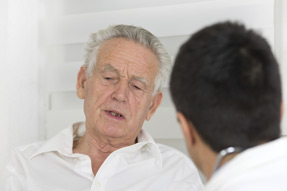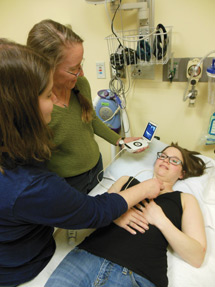Alzheimer's patients prepare, enlighten future physicians
A mentoring program pairs Alzheimer's patients with medical students to heighten students' awareness of the skills and strengths of Alzheimer's patients and familiarize them with related care and communication issues.
Internist Alexis Dunne, MD, from Oswego, Ill., vividly remembers her relationship with “Albert,” an Alzheimer's patient who mentored her during her first year of medical school. Together, the pair visited museums, lunched, and enjoyed long conversations about Albert's life adventures.
“I loved my buddy,” said Dr. Dunne, who graduated from Northwestern University Feinberg School of Medicine. “He was one of those older, real gregarious guys who loved to tell stories. We really had a lot of fun. I always looked forward to my time with him.”

The duo kept in touch for years, until Albert moved to a long-term care facility. But her mentor is not far from Dr. Dunne's mind when she treats senior patients and those with memory loss.
“This is something we deal with every day as internists—memory loss,” she said. “We deal with how our patients are experiencing it and how their families are experiencing it. Learning how to interact with someone with memory problems was probably the biggest [lesson] I learned as a medical student.”
Dr. Dunne's and Albert's partnership is 1 of nearly 200 created through the medical school's Buddy Program, now in its 17th year, which matches first-year medical students with early-stage Alzheimer's patients for a year-long mentorship. The purpose is to heighten students' awareness of the skills and strengths of Alzheimer's patients and familiarize them with related care and communication issues. It is also aimed at introducing students to research and practice opportunities in fields related to aging and dementia.
“The ultimate goal is for the student to have an opportunity to get to know a person with Alzheimer's in a nonclinical setting and develop a more holistic understanding of what dementia is and what living with it is like,” said the program's founder and leader, Darby Morhardt, PhD, education director of the Cognitive Neurology and Alzheimer's Disease Center at Feinberg. “Yes, they are losing abilities, but it's not just an illness about loss. There are a lot of things they are still able to give.”
The Buddy Program's popularity and success have sparked similar programs at other institutions, including Boston University School of Medicine, Geisel School of Medicine at Dartmouth in New Hampshire, and Washington University School of Medicine in St. Louis, Mo. Albany Medical College in New York and the Kansas University School of Medicine in Kansas City launched new programs in 2013.
The growing number of such programs comes at a time when the number of Alzheimer's patients is rapidly increasing. About 5 million Americans currently live with Alzheimer's disease, according to the most recent data from the Alzheimer's Association. By 2050, that number is expected to triple.
At the same time, few medical school graduates are pursuing advanced training in geriatrics. In 2010, only 75 residents in internal medicine or family medicine entered geriatric medicine fellowship programs, down from 112 in 2005, according to American Geriatric Society numbers.
But generating more geriatricians is not what makes the patient-student relationships successful, noted John C. Morris, MD, FACP, director and principal investigator of the Charles F. and Joanne Knight Alzheimer's Disease Research Center at Washington University.
“The major goal of the program is not necessarily to steer or influence first-year medical students into a career choice that focuses on caring for demented individuals,” said Dr. Morris, of Washington University's Dementia Understanding Opportunity (DUO) program. “That would be a welcome outcome, but the main goal of DUO is simply to destigmatize dementia and Alzheimer's for students who lack first-hand experience with affected persons and their families. It also helps students appreciate that these patients still have much to offer.”
He continued, “The reality is, patients are getting older. Even if you're a rheumatologist or a gynecologist, you're going to end up seeing people who have dementia, so it is helpful to be exposed to [patients with dementia] during training.”
Finding ideal ‘buddies'
Not just any student or patient is chosen to participate in the Buddy Program, Dr. Morhardt said.
Students apply and are evaluated before Dr. Morhardt chooses 10 to 12 per academic year. The students are required to meet with their mentor for 4 hours a month and regularly attend meetings to discuss their experiences.
“We emphasize the need to commit themselves,” she said. “The commitment to the patient—the mentor—is really vital. They need a student who is going to follow through.”
Patient mentors must be in the mid-to-early stages of the disease and have some awareness of their diagnosis. They also must show an interest in working with young medical students.
Criteria are slightly different for Dartmouth's The Alzheimer's Learning Experience for Students (TALES), where 2 students, rather than 1, are matched with an Alzheimer's patient, said Robert B. Santulli, MD, associate professor of psychiatry and director of geriatric psychiatry at Dartmouth-Hitchcock Medical Center. That dynamic generally works best since spouses and caregivers often are part of outings and activities, he said.
The TALES program previously accepted both medical students and premed students, but change its focus to only senior premed students.
“My feeling is that once students are into the medical education model, they're very focused on disease, more than on people,” Dr. Santulli said. “That's understandable. It's almost inevitable because they have to learn so much about disease. [We] want them to focus not on what's ill about these patients, but about what's preserved. I think getting them that early, you have a better chance of having an impact on that student.”
Seniors and students in Boston University's Partnering in Alzheimer's Instruction Research Study (PAIRS) program participate in a variety of activities, said Andrew Budson, MD, the program director and professor of neurology and associate director of the Boston University Alzheimer's Disease Center. PAIRS participants have attended concerts together, ridden bicycles, participated in charity events, and gone for walks, among other activities.
“We let the patient and the student sort that out together,” Dr. Budson said. “Some of our buddies in the program have been beyond the mild stage and into the moderate stage. Students [in that case] have met with them at home, played games, [and] looked at pictures.”
Glimpse into family impact
Program coordinators stress that students' experiences with caregivers are nearly as important as interactions with Alzheimer's patients.
“It's very helpful for the student to have a patient that lives with a spouse because the impact on the caregiver is a main part of this disease,” Dr. Santulli said.
Second-year medical student Jeffrey Gluckstein recalls the invaluable lessons he learned from his mentor's caregiver during his participation in Washington University's DUO program.
Because his mentor, “Jim,” was a bit quiet, Jim's wife often would help start conversations among the three, said Mr. Gluckstein, an ACP Medical Student Member. Mr. Gluckstein also learned from his partner's spouse how much Jim's personality had changed since the disease took hold.
“One of the bigger things [I learned] was appreciating how much the caregiver does,” he said. “We hear that in our lectures, but actually having to see it firsthand, it's a big involvement.”
Mr. Gluckstein believes his interaction with the couple will positively impact his future practice.
“I think I'm more likely to ask about caregivers in these situations and have a better understanding of the cost to” care providers, he said. “I don't know if I would have taken it as seriously if I hadn't had that first-hand experience.”
Dr. Dunne's partnership with her mentor revealed the opposite side of the spectrum: a patient who was alone.
She remembers visiting an apartment in disarray and strewn with reminder sticky notes. A few times, her partner forgot their meeting and failed to show up, she said.
“He was having a hard time keeping it together,” Dr. Dunne said. “He had good days and bad days. It definitely gave me some insight, seeing his apartment, seeing how he lived day to day.”
Programs pack big impact
Students face unique challenges during their mentorships, but program administrators say overcoming the difficulties is part of the process.
DUO program participants frequently note their uncertainty about whether to correct partners when they make a mistake or stop them when repeating the same story, said Jennifer Phillips, MPA, education core coordinator at the Knight Alzheimer's Disease Research Center at Washington University.
“It's the idea of learning to listen to what's being said, what's being conveyed, without being spoken,” Ms. Phillips said. “There are a lot of subtleties the students have had to learn to watch for when working with their mentor.”
Students may encounter patients who forget previous visits or even the students themselves as their disease progresses, Dr. Morhardt said.
To reflect upon challenges, questions, and feelings, students in the Buddy Program keep journals. Other programs require participants to blog about their experiences. The essays regularly include themes such as heightened sensitivity and empathy toward Alzheimer's patients and changes in the students' perception of dementia, program coordinators said.
Scores on a Dementia Knowledge Test created by Dr. Morhardt and colleagues show modest improvement in student knowledge after program completion. A study published in BMC Medical Education in 2012 found that Buddy Program graduates had an 8% increase in dementia knowledge while participants in the PAIRS program had a 7% improvement.
With the significant success of Alzheimer's patient partnerships, Dr. Santulli is surprised all schools do not run match programs.
“The students love it,” he said. “The patients love it. I think this kind of thing will catch on as the word gets out there. People will say, ‘It's a good idea, let's do it.’”
The programs are not just worthwhile but are vital for the future, added Dr. Budson.
“The fact is, Alzheimer's and other cognitive disorders are increasing as our population is aging,” he said. “We need to have more doctors who are equipped to take care of these patients, make proper diagnoses, and initiate proper treatment. Programs like these are very important.”



